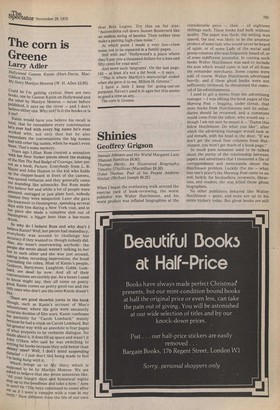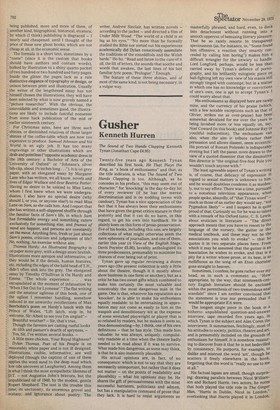Shinies
Geoffrey Grigson
Samuel Johnson and His World Margaret Lane (Hamish Hamilton £6.95) Thomas I-tardy. An Illustrated Biography Timothy O'Sullivan (Macmillan £6.50) Dylan Thomas. Poet of his People Andrew Sinclair (Michael Joseph £6.25) When I began the everlasting walk around the exercise yard of book-reviewing, the worst publisher was Walter Hutchinson, and his worst product was inflated biographies at the considerable price — then — of eighteen shillings each. These books had bulk without quality. The paper was thick, the setting was spaced, the text was likely to be the amateur product of some lady who would never be heard of again, or of some Lady of the social and gossip columns who was frequently heard of, or of some indifferent journalist. In costing such books Walter Hutchinson was said to include the sum which would come in last of all from the remainder merchants. Some copies were sold, of course. Walter Hutchinson advertised heavily, and if these ghost books were not sufficiently reviewed, he threatened the removal of his advertisements.
I used to get a memo from the advertising manager — I was editing the book pages of the Morning Post — begging, under threat, that more books from Hutchinsons and its subsidiaries should be reviewed; and a summons would come from the editor, who would say — though I am not sure he meant it — "Damn this fellow Hutchinson. Do what you like"; after which the advertising manager would look in and remark, with his head in the door, "If we don't get the usual four columns from Hutchinson, you won't get much of a book page."
So much pure nonsense used to be talked about the purity of the relationship between papers and advertisers that I treasured a file of correspondence and memoranda about the Hutchinson problem. Luckily (for me — what was one's price?) the Morning Post came to an end; luckily for booksellers, reviewers, librarians, and readers, the wars killed those ghost biographies.
No other publishers behaved like Walter. Hutchinson — quite; and none are up to his entire trickery today. But ghost books are still being published, more and more of them, of another kind, biographical, historical, etcetera, by which (I think) publishing is disgraced — I nearly said cheapened, until I thought of the price of these new ghost books, which are not . cheap at all, in the economic sense.
The formula is a short text, sometimes by a "name" (since it is the custom that books t. should have authors and contain words), bulked by illustration to a shiny quarto packet of two hundred or two hundred and forty pages. , Inside the glitter the pages lack as a rule ' distinctive elegance of typography or design, or unison between print and illustration. Usually the writer of the lengthened essay has not himself chosen the illustrations; they will have been selected by what is now gravely named a : "picture researcher". With the obvious, the : -unavoidable and sometimes good, the illustrations are likely to include fanciful nonsense from some hack publication of the mid or -earlier nineteenth century.
; For Christmas sales, here are three such shinies, or diminished relatives of those larger shinies of the coffee-table which are now too
• expensive to produce. Samuel Johnson and his 'Wo'rld is an ugly job. It has too many engravings or other illustrations which are drab and pointless ("opposite academic dress in ::-the 18th century: a Bachelor of Arts of the -University of Oxford" or "Johnson's silver about 11/2 inches long ..."). It is on grey paper, with an elongated essay by Margaret Lane who has written, we all know, novels and lives of Edgar Wallace and dear Beatrix Potter. Having no desire to be unkind to Miss Lane, whom I first knew when we were undergraduates, I also have no special desire' (why should 1, or you, or anyone else?) to read Miss ; Lane on Sam, as she calls him. And I report that !. she has written a soft-slippered shuffle through the familiar facts of Sam's life, in which Sam ' has formidable energy and something caters exclusively for something else, and frames of .* mind are happier, and persons are constantly on the move. Anything firm, fresh or just about Sam's poems, criticism and judgement of life? No, nothing. An exercise without aim. Thomas Hardy. An Illustrated Biography is , on paper more grey, with a design more brutish. Illustrations more apropos and informative; or . they would be if the details, human features, etc, including the edges of the bald head of T.H., didn't often sink into the grey. The elongated essay by Timothy O'Sullivan is On Hardy and . Emma: "The whole experience . . . was encapsulated at the moment of infatuation by ; 'When I Set Out for Lyonesse'." The flat writing and the amateur ugliness of this book, one of the ugliest I remember handling, somehow induced in me unworthy recollections of Max Beerbohm's poem on Hardy's lunch with the Prince of Wales, "Lift latch, step in, be :welcome, Sir/Albeit to see you I'm unglad"— .: Beautiful weather? — Sir, that's true, Though the farmers are casting rueful looks At tilth and pasture's dearth of spryness, — Yes, Sir, I've written several books. — A little more chicken, Your Royal Highness?
Dylan Thomas. Poet of his People is on reasonably white paper and is not ill designed. Illustrations, visible, informative, are well deployed (though the caption of one of them applies the word sand to the deep mud which low tide uncovers at Laugharne). Among them is what I think the most sympathetic likeness of — not Augustus John's bravura, but the unpublicised oil of 1940, by the modest, gentle . Rupert Shephard. The text is the trouble this time; its unctuosity, its enormous grovel and ecstasy; and ignorance about poetry. The writer, Andrew Sinclair, has written novels — according to the jacket — and directed a film of Under Milk Wood: "The world of a child is as big as his eyes." "No more than he formally studied the Bible nor sorted out his experiences academically did Dylan consciously assimilate the traditions of the eisteddfods and the Welsh bards." Ho ho. "Read and listen to the care of it all, the lilt of letters, the sounds that soothe and worTN that awaken, the last lines of his last familiar lyric poem, 'Prologue'." Enough.
The feature of these three shinies, and of most of the same kind, is not being necessary, in a vulgar way.



































 Previous page
Previous page